But motor fuel prices plunge, and inflation in durable goods and food cools – same as everywhere.
By Wolf Richter for WOLF STREET.
This is a global phenomenon: Inflation has moved from energy products and durable goods to services. Inflation measures that track services are redlining, and “core” measures, that exclude food and energy products, are stuck at very high levels, driven by inflation in services, while overall CPI readings have been pushed down by plunging energy prices and by either slowly rising, flat, or even dropping prices in some major durable goods categories as the supply chain chaos has gotten largely resolved. And so, inflation has gotten solidly entrenched in services, where it’s very hard to combat.
The UK Services CPI spiked by 1.0% in July from June (12.7% annualized), and by 7.44% year-over-year, the worst services inflation in 40 years, edging past the prior four-decade record of May (7.35%), according to data from the UK Office of National Statistics (ONS) today.
This was broad-based, not just one big item, driven by red-hot increases in insurance of all kinds, rents, transportation services, particularly by air and rail, water & sewer charges, various healthcare services, restaurants, hotels, etc.
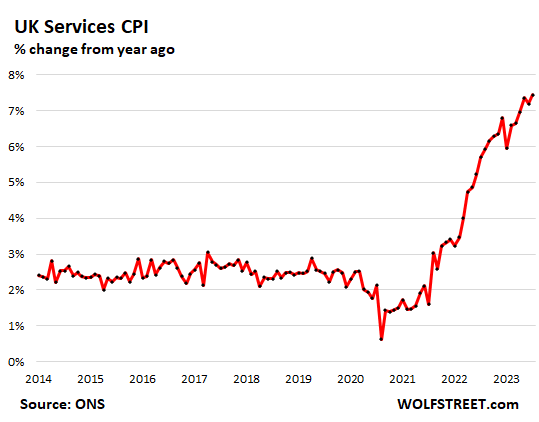
It’s in services where all heck has now broken loose. A similar record price spike in services is raging in the Eurozone. In the US, red-hot services inflation was cooled somewhat by special effects that will flip in the second half of the year.
The UK Durable Goods CPI fell by 1.3% in July from June, the second month in a row of declines, and the steepest drop since January 2013. It reduced the year-over-year gain to 3.9%.
The month-to-month decline was a result largely of the CPIs for vehicles (cars, motorcycles, and bicycles), furniture, products for outdoor recreation, games and toys, audiovisual equipment, and computers. All the stuff that had gotten hung up in the supply chain chaos in 2020 through 2021 is now plentifully available, and the huge price spikes of yore are partially being whittle down.
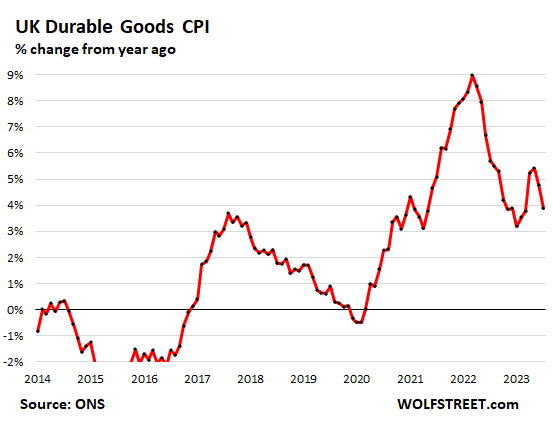
So Core CPI rose by 6.9% year-over-year, same as in June (actually, unrounded, just a hair above June), the second-worst reading since March 1992, the worst having been May (7.1%).
Core CPI excludes energy products, food, alcohol, and tobacco. So this is not looking very propitious, and it’s driven entirely by services – not goods:
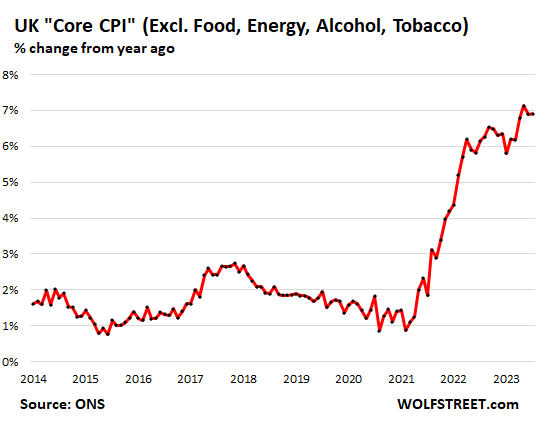
Food inflation is cooling from the horrible pace earlier in the year. The CPI for food and non-alcoholic beverages rose by just 0.1% in July from June. The month-to-month drop was driven by fruit (-1.0%); coffee, tea, and cocoa (-1.4%), milk, cheese, and eggs (-0.4%). But fish prices spiked (+1.9%).
Year-over-year, the CPI for food rose by 14.8%, and as bad as it is, it was the least terrible since September 2022.
Food inflation has been a global phenomenon, and not the result of Brexit: a number of countries in Europe had worse food inflation than the UK. And all of them are cooling.
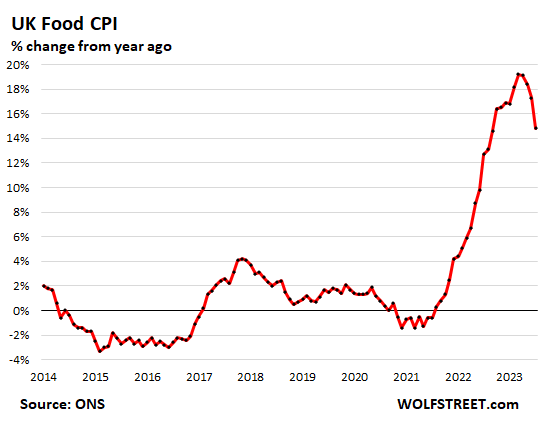
Motor fuel prices plunged by 24.9% year-over-year, after having spiked by as much as 44% last summer.
Month-to-month, prices dipped 0.4%, after having plunged in 9 of the past 10 months, by month-to-month rates between 1.2% and 6.8%. This collapse of the price spike last year has taken a lot of pressure off the overall CPI:
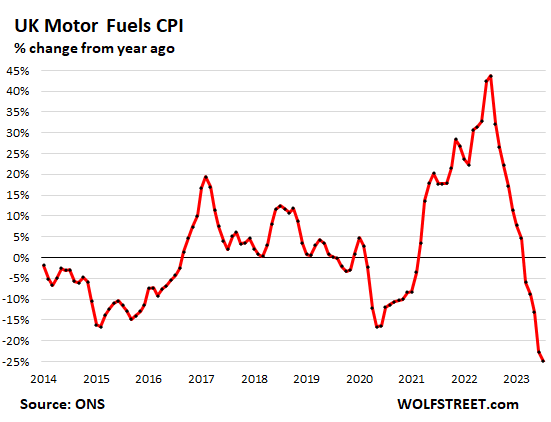
Overall CPI rose by 6.8% in July compared to a year ago, the smallest increase since February 2022, pushed down by the collapse of the spike in fuel prices, cooling prices of durable goods and food. But fuel prices aren’t going to plunged 25% per year forever. And the price spikes in services continue unabated. So the days of the downtrend are numbered. In the US, the downtrend of overall CPI has already reverted to an uptrend.
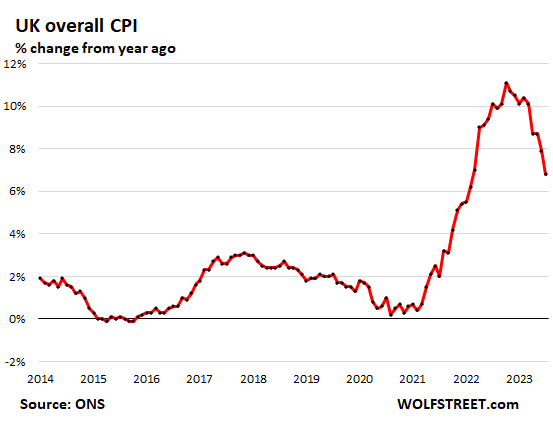
The bond market is slowly buying into the concept of “higher for longer” – meaning higher inflation and higher policy rates for longer. The 10-year UK Government bond yield has risen above the pension-fund panic spike in October last year that had caused the Bank of England to intervene briefly. It reached 4.65% today, and this time, the BOE, facing further rate hikes, is smiling thankfully at the markets for carrying its water. Little by little:
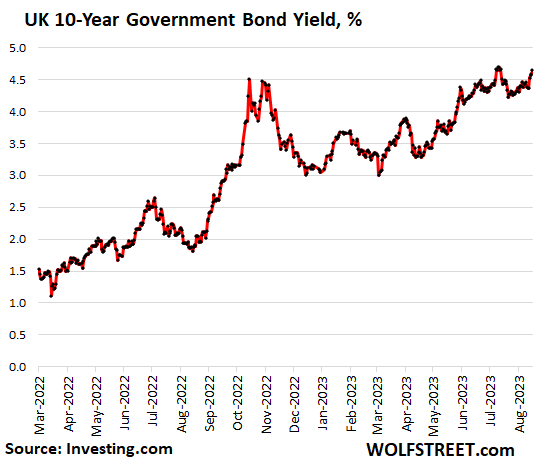
Enjoy reading WOLF STREET and want to support it? You can donate. I appreciate it immensely. Click on the mug to find out how:
![]()


Frontal assaults of mass layoffs?
Artillery fire of cut hours?
Flank assaults of limited raises?
“And so, inflation has gotten solidly entrenched in services, where it’s very hard to combat.”
We know US consumers are a bunch of drunken sailors and trying to out spend and out do inflation…are our UK comrades doing the same?
Live in Berkshire England. I can confirm it’s happening alright.
Products can be off-shored but most services have to make use of domestic labor so inflation in labor costs ( both in what you pay and what is added on to each paycheck) drive up the price of services. Its a good time to figure out how to trim your own nails, cut your own hair and fix your own furnace.
Drill you own teeth.
Install your own pacemaker.
Remove your own tumor.
Self insure house, car et cetera.
Defend yourself in court.
As prices for these things are your list go up too high you could do the following:
Don’t eat sugary or over processed foods so you won’t have tooth decay
Live a heart healthy and active life so you don’t need a pacemaker
Stay away from harmful chemicals, plastics, herbicides, pesticides etc. so you won’t get a tumor.
Join with your neighbors in a collective to rebuild each others houses in case of disaster like the Amish do. Get rid of your car and ride transit or a bike.
Stay away from shady people, and occupations to minimize your involvement with the legal system, but if you need to , study the law and defend yourself.
Just FYI a pacemaker is from a defect in your heart. When you get older the heart does not keep up its minimum beats needed to keep you from passing out. So you start having passing out spells.
You see a cardiologist and they slap one of those bad boys in for 10 years. Ideally you’ll never need the battery replacement. But the wires are in place if you do.
The most common problem pacemakers address is bradycardia (heart beats too slowly) due to problems with the electrical system of the heart. It is an issue unrelated to heart disease. I had one installed when I was 40, shortly after running 2 marathons and several shorter races. I knew my heart rate was low from wearing HR monitors while running, but didn’t realize my passing out was a sign of a larger problem no amount of exercise could solve.
Many cancers are gene based, such as the BRCA1 mutation which runs in my wife’s family. Women with the mutation have an extraordinarily high risk of getting breast and ovarian cancer.
The point is, sometimes people have conditions beyond their control and need specialists to help treat them. Many services, especially in medicine and law, require a level of expertise it is not practical for most people to obtain on their own.
sufferinsucatash,
“Ideally you’ll never need the battery replacement.”
I’ve had my pacemaker replaced once already, and I’m hoping to replace it at least 1 or 2 more times, given the alternative. ;-)
The local BMW dealer now charges $289 for an oil change. Can anyone beat that? I do my own changes on other cars but always let them handle the “nice car” which is now 21 years old. Next oil change I’ll watch YouTube and do that one myself too. EV cars will solve that problem eventually.
Since you can’t “drain” the oil BMW oil changes are a PIA. Pay the man. The consiquences are an even larger bill later on.
… but will the battery be still good after 21 years?
You can always use a pump to pump the oil out of the crankcase and change the filter by hand.
Now, back to the USA.
MND shows the 30YFRM as 7.34% today with only 0.03 to go to last October’s high.
Thank goodness. Drive those mortgage rates through the roof, BABY! Bring on a good old recession. That’s how we get the disinflation that will solve our current conundrum.
Go JPowell, Congress & Joe Consumer! Keep spending money like Wolf’s drunken sailors analogy.
More inflation means higher for longer. Woohoo!
Target had a blip of bad news in earnings.
That place keeps ripping me off, their circle offers never ring up at checkout and their sale items didn’t ring up either.
Had to get on chat to fix it. Dunno if those are signs of a deeper issue. The stores are prob understaffed too.
“…That place keeps ripping me off.”
And yet you still keep going there? Amazing.
And deal with Walmorons? No no no
The other alternative has been negated by porch pirates.
Haven’t tried the kiosk package pickup at Whole Foods yet. Thinking about it.
So yep, stuck with the bullseye.
Complaining and hoping for change is far more desirable of an attitude than quitting.
Holy Cow, Batman! The ATL Fed GDP Now Q3 forcast just rocked up from 4.1% to 5% to now within a hair’s breadth of 6%.
Go team, USA! Inflation is GREAT! It ensures JPowell can’t take his foot completely off the gas.
More rate increases & higher for much, much longer. Woohoo!
It’s a little too early in the quarter to pay a lot of attention to the GDPNow. It only has a few data points so far, and they were all strong.
I realize the forecast is subject to strong fluctuations and the usual solidifying as the Qtr wraps up.
But half way through is quite meaningful. And I would imagine that there recent surge in bonds is taking into all these strong economic growth signals.
I’ll be very surprised if the final number is below 4% even after the eventually revision.
We’re not “half-way through” the data. The first Q3 data, for July, just started coming in last week.
Too early? We’re 45 days into the quarter and the real time (“Now”) data say “Pay Attention”.
Don’t want deflation that can be worse than inflation as noted by the Great Depression so I’m happy with the Fed current pause and continuing QT. We have had some great innovations in the past decade including this site so I love tech AI, self driving EV etc as long as I don’t hear a narrative of fossil fuels reduction at any cost . I want the least expensive energy source that I can afford .
Inflation is leading many citizens to Great Depression-like everyday life situations.
Prices go up and then stay there. Media announce price declines that are rates of increase going down, but it sounds good.
The only true solution to a spike in inflation is a spike in deflation. That was the 1930s.
The stock market wasn’t rigged back then so it actually fell when it became grossly overvalued unlike today. That caused a lot of deflation.
BS ini,
I don’t understand why you equate any amount of deflation with the Great Depression. As a retiree, I’d like to see about three years’ worth of deflation, especially in house prices.
Something has to break housing.
It’s downright out of control.
Pauses to FFR increases and QT aren’t going to cut it.
I’m all for lithium ion batteries I can fill up with sun juice!
Just keep the greedy power conglomerates away from my free energy. They would have 11 fees ready each refill I do.
The Sun and I will take our ball and go home. Ha
Wage inflation around the world is interesting in demographics terms, but even more fascinating when viewed as a productivity dynamic related to technology. Obviously, this will be interesting to watch with the hype of AI.
Nonetheless, it’s worth scanning old ideas about cost Disease (baumol effect):
“ Economic growth and aggregate productivity
In his original paper on the cost disease, Baumol argued that in the long run the cost disease implies a reduction in aggregate productivity growth and correspondingly a reduction in economic growth.[6] This follows straightforwardly from the labor distribution effects of the cost disease. As a larger and larger share of the workforce moves from high-productivity-growth industries to low-productivity-growth industries, it is natural to expect that the overall rate of productivity growth will slow. Since economic growth is driven in large part by productivity growth, economic growth would also slow.”
I imagine that UK spike will be like COVID and head across the pond, and infect the Fed…
Food inflation, shrinkflation and skimpflation in the UK have slowed dramatically this summer.
Back in the spring, food prices at the supermarket were (literally) leaping 10-20% every 2-4 weeks. It was nuts. For now, approaching autumn, prices are once again stable, and some are falling slightly.
Overall, in the real world, it’s fair to say UK food retail prices in 2023 are about +100% more expensive than they were at the start of covid back in 2020. It’s been the worst inflation period for UK food for at least 50, perhaps 80, years.
Food prices trending down at glacial pace — and portion sizes remain smaller, a real win for consumers
Until something breaks yields especially on the long end will continue to rise. A bear steeping will continue. I found it funny that some posters felt that Bill Grosses predictions on bonds are irrelevant because of his age. I ve seen plenty of young bucks get destroyed when a bull market turns bearish. As with the UK the US has imbedded wage inflation. The smug response regarding the down grade of US debt by Yellen will definitely come back to bite her on her big fat a.. Her response shows they just don’t care about the deficit. In the buggy whip days of bond trading we always had a risk premium over the inflation rate because faith in the government was minimal.If nothing breaks yields will start pricing a risk premium over inflation. Yellens complete disregard for the deficit telegraphs the administrations mind set regarding future spending.
Its surprising people haven’t cutback on services yet. These are some of the most expensive, least valuable items in the budget.
It’s a sign consumers aren’t the least bit cost conscious.
Yeah me too, I get that people are experiencing wage inflation but travel expenses for instance are insane right now and they can only be this insane if people are paying them. It’s definately affected my spending, I can’t justify blowing 450 a night on a room that was about half that not so long ago, but maybe I’m just a cheap arse.
On the other hand, my barber was always expensive and now charges about 20% more and I’m still going there, so I am part of the problem that way.
What kind of education does on need to trade bonds at a big outfit? GS LEVEL (not GS, I realize they only take the best out of schools)?
Thanks.
Hi NBay,
I started in the early 1980’s when trading was rough and tumble. I worked at the big houses and started at Lehman Bros. Back in the day you could get a job out of college with a bs. Back in the day we hired guys who could handicap the horses and they were usually very good.
It was funny to see them out perform the ivy leaguers.
You can learn anything from reading. I believe one of the important keys to the market is learning about the rates market. There are plenty of books around. I would not know how to get a job today unless you had a ridiculous ivy degree. Although there might be some hedge funds that would take a flyer on you and teach you the ropes.
Inflation isn’t a monolith. Some prices go down, some prices go up. Lots of factors besides interest rates go into this.
CPI to 2% won’t be graceful. There will be huge swings in both directions for different baskets of goods and services.
Whack a mole. Many moles breaking things. Will be interesting to see what national banks do with interest rates when CPI reads 3%+ but there are also several fires to put out…
Counterintuitively one thing that helped reduce inflation in the 1970s was high fuel prices, predominantly oil, by gently slowing the economy down everywhere. Unfortunately, today there seems to be far more gas and oil than customers to buy it, and these graphs sadly show prices declining.
Perhaps government could generate the same effect as high prices through windfall taxes. There is just so much money out there creating inflation, it is mind boggling that it isn’t being taxed away for a win- win of government and the population.
This is correct — fiscal policy is in the driver’s seat here, not monetary policy. But nobody wants to hear that.
I just watched a Milton Friedman lecture on inflation, and the parallels of the 1970s USA and UK inflation compared to today are astounding.
Milton Friedman literally predicted this inflationary crisis.
Dont think of inflation as the highest in 40 years.
Think of it as the lowest for the next 40.
Wolf, poster R2D2 mention shrinkflation, where the price of the item stays the same but the size of the product is reduced. Does this scenario get noted in the CPI? Or is it like a 6.5 oz can of that used to cost $1.50 now is a 5.5 oz can of tuna that cost $1.50 is treated as no price increase? For some reason I never considered how it gets treated in these reports.
Yes, as you state in the second part. CPI goes by quantity, weight, or volume, such as 1 gallon of gas, 1 ounce of cheese, 1 ounce of steak, 1 ounce of granola, etc. Shrinkflation is designed to pull a bag over the buyer’s head. But it doesn’t impact CPI.
CPI doesn’t take account of quality drops which we are for sure seeing in many, many products. Shoes are now an annual subscription service. Same for jeans, everything wears through way faster.
CPI understates reality.
My Levi’s last just as long as they did when I was in high school. I wear the blue ones every day all day long until they’re rags, which takes several years. My dress jeans for festive occasions are black, and they’re tighter… I try to look good, LOL. They last forever because I wear them only once or twice a week for a few hours or so. I buy them on sale online. Inflation is hard to figure because I can still find them for sale at $20 occasionally online, which is when I pounce. I used to pay $20 when I last bought them at the Levi’s store in 2006, maybe. When it comes to jeans and smart shopping, CPI overstates reality.
I don’t think you’ll find a single human on the planet who will agree with you that goods durability has not gone way down.
From jeans to trainers to sieves to can openers to bicycles. Printers have a sell by date built in even if they *don’t* wear out.
Everything costs more. Everything is less durable. Tax margins are lower relative to median wage. Housing is higher relative to median wage.
You’re kidding right? For example, cars have gotten a lot more durable. 100,000 miles back in the 80s was about all an American engine was good for. Then you needed to replace it. My 1968 Mustang that I bought in 1976 was a POS. All kinds of stuff just fell off. Now, 300,000 miles on an engine is just fine. We put nearly 200k miles on our car (2006 model) and it was in great shape, except for the body damage, LOL.
I’m done with this nonsense.
So basically around the world …. to get anyone to actually show up and work, employers were forced to jack up wages and have now passed all of that plus more along to the consumers …… who are basically too stupid to not continue to buy their services no matter the increase in costs. Is that about it?
Everyone always blames higher wages for ALL the problems.
I think the higher prices on goods and services came first. Then higher housing costs. Forcing the employees to seek more money to pay their bills.
Then this led to the higher prices paid at let’s say McDonald’s.
Not to mention the little trick a lot of managers use now: have a skeleton crew to run the store to keep payroll down. Upping consumer wait times, but helping the corporate bottom line.
When is Bernanke report coming out about what is causing this inflation in UK?
Probably about the same time as he recommends helicopter money.
10 year gilt over 4.7%, higher than it was last Sept/Oct that caused issues with their pensions. I wonder how that’s going now. IMO their economy is going to get more inflation for a lot longer…
Inflation in the UK will continue higher forever because it’s more profitable to do no work and to force someone else to give you some of their labour, via housing. Adam Smith called this “rentier” activity.
Anyone in the 1800s would have immediately distinguished the two.
The UK and most of the west has no concept of splitting out wealth creation from rentier activity, and even worse their inflation stats don’t fully incorporate house prices.
Therefore none of their economic growth is correctly inflation adjusted.
It’s like those French pilots who followed their faulty instruments and just aimed their plane straight into the sea.
The MMT drug called QE has to be taken away for good, so the hangover can begin, but I’m not sure this Fed has the conviction to do it. Thus far, the Fed is about as convincing as an addict saying he’ll go to treatment. Lets see what happens when the shakes set in.
Congress is offering the Fed a continued supply of what it needs, while whispering “don’t worry about tomorrow”.
My local motor fuels went from $3.29 to $3.99 (8/17/23) in the past 3 weeks. Exactly the same price as it was on 8/7/22.
Got a feeling its headed back to $4.50+